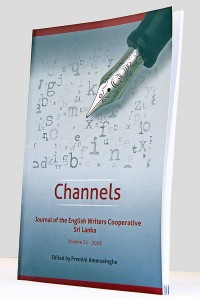Works of promise that need to evolve
 Volume 22 – 2016 of Channels – the Journal of the English Writers Cooperative of Sri Lanka (EWC) showcases Sri Lankan creative writing as well as the winning entries for the EWC’s annual short story and poetry competition. This issue of Channels is edited by Premini Amerasinghe and features 26 short fiction and poetry contributions by established and aspiring Sri Lankan writers.
Volume 22 – 2016 of Channels – the Journal of the English Writers Cooperative of Sri Lanka (EWC) showcases Sri Lankan creative writing as well as the winning entries for the EWC’s annual short story and poetry competition. This issue of Channels is edited by Premini Amerasinghe and features 26 short fiction and poetry contributions by established and aspiring Sri Lankan writers.The issue opens with two tributes to key Sri Lankan literary figures who were seminal members of the EWC Sri Lanka and whose absence leaves a void in local literature – Prof. Ashley Halpe and Anne Ranasinghe. “We at the EWC will always remember Ashley as a true and sincere friend, a teacher of the highest calibre who eased the rutted path for amateur writers,” writes Vijita Fernando. While Editor of this issue, Premini Amerasinghe writes a poignant tribute to poet Anne Ranasinghe, tracing her move to Sri Lanka, the ripple effects of her poetry and her role in supporting and building Channels, as a founder member of the EWC. The tribute to Anne as a pioneer of the EWC was written before her death.
The prize-winning short stories by Nelani Goonawardena, Lara Wijesuriya and Rohini Gamage were interestingly written and dealt with wide-ranging themes. The prize-winning poetry in this issue by Himangi Jayasundera, Nelani Goonawardena and Keerthi Wijekulasuriya were enjoyable and well-crafted.
Nanda Pethiyagoda Wanasundera’s short story ‘The Lantern’was a lucid, nostalgic stroll down memory lane, dwelling over a childhood past and once-soured old friendships now given a new lease on life. Shelton Amarasuriya’s droll poem ‘Civilizing the English Language’ makes a reader pause and reflect on how “spattered with inconsistencies, incomprehensibles and unnecessarily long” the English language is. The poet unpacks everyday words and pronunciation, holding out examples to mull, sigh and laugh over. “While “Bough” is ‘bow’ as in ‘owl’, “Rough” ’s ‘ruff’, “Cough” good heavens is “corrff”!!” laments a line in the poem.
Ranjan M. Amarasinghe’s poem is a meditation on Mother Nature, prompted by the untimely death of a squirrel at the hands of a pet dog. Vimala Ganeshananthan’s poem is a first-hand account of the writer’s visits to the refugee camps of those affected by the war. “Two hundred thousand languish on Vanni’s scorched earth, starring in ‘The saddest show on earth’”, writes Ganeshananthan, of helpless refugees robbed of home, agency, their belongings and identity “forever named ‘The Internally Displaced’”.
There was a marked difference in the quality of the short stories and poetry published in this edition of Channels. While there was evident keenness and creativity in all the submissions, attention to detail, characterization and exposition were absent in some of the short stories. Most of the stories read like strong first drafts which showed a lot of promise and potential, and it seems necessary to reiterate and emphasize the editor’s comments on the need for thoughtful writing and re-writing over a period of time.
The editorial in this issue asserts that “‘Channels’, as the name implies is a ‘conduit’ for aspiring writers (young and old) to showcase their writing skills. It is a means to an end, not an end in itself.” In a country where there are few publishing platforms which endure the test of time, journals such as Channels have a vital part to play in encouraging English writing in Sri Lanka. It is hoped that the EWC will continue to grow and evolve, supporting local talent and showcasing quality Sri Lankan writing in English to the world through Channels.
A.I.
The magazine priced Rs. 250 is available at Vijitha Yapa and Sarasavi bookstores


